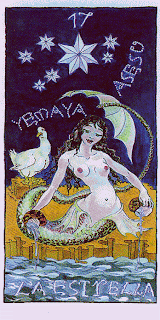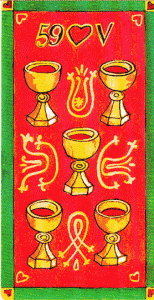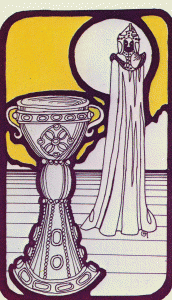
Artist: Luigi Scapini
Author: Emanuele Coltro Guidi
Interpretation: “The stars are so far that they don’t listen to anyone. The path (avatar) of Yemaya, Yoruban Goddess of the sea, called Asesu is a deaf Entity. Yemaya Asesu goes on with her business and doesn’t listen to much. The patiki tell us that before listening to questions she counts all the feathers of a duck who was sacrificed as ebbo to her.”
Part of the purpose of the Tarot Lukumi deck is to build a bridge between the world of Cuban Santera (Relga de Ocha or Relga Lukumi) and the occult tarot to demonstrate universality of the rules of Magic. I am especially fond of this purpose.
Throughout the history of the occult tarot, different readers have used their preferred method of magic to divine meaning from the cards: Astrology, Kabbalah, Masonic Hermetism, Jungian psychology, and so on. In order to find meaning in a foreign system, one must find the correspondences with an understood system. This is the basis of syncretism. It is also the basis of learning to love one’s neighbor as one’s self.
Santeria is an anamistic religion coming from the syncretism of the religion of the west-African Yoruban tribes people and Catholicism. Following their abduction to the Indies for the purpose of slavery, Spanish law mandated that these people be baptized Roman Catholic. But Catholicism was not a big hit among the slaves. [If someone abducted me from my homeland; placed me on a ship in a manner similar to which I do not approve of cattle being treated; left me there for weeks with minimal life support on a nauseating ocean voyage; separated me from my family & sold my children & subjected me to a life of forced labor I, too, would have trouble accepting their notions of god.] In attempt to appease their tormentors, many slaves pretended they were Catholic. Thus began the syncretism of Yoruba and Catholicism into Santeria.
The Star, in this image, is pictured as a mermaid sitting on a sandbar pouring water from two conch shells into the sea. Behind her is the sacrificial duck whose feathers she counts before listening to questions. In the sky are seven stars.
I learned the star as a card of hope, and when I think of hope, I think of Pandora. In Greek mythology, Prometheus, champion of mankind and traitor to the gods, stole fire from heaven. Zeus punished Prometheus by binding him to a rock. A great eagle ate his liver every day; the liver grew back and was eaten again the next.
The gods, still bitter that Prometheus had given the gift of fire to man, then took vengeance on humankind by means of Pandora, the first mortal woman. Pandora was endowed with every gift known to women: beauty, grace and desire from Aphrodite; cunning and boldness from Hermes; gardening msp free vip codes from Demeter; manual dexterity and spinning from Athena; sweet singing and lyre playing from Apollo; and a pearl necklace from the god of the sea who promised she would never drown.
The gods then placed every plague and sorrow into one jar and presented the jar to Pandora with the instructions do not open under any circumstance. Pandora was then presented as a gift to Prometheus’ brother.
So of course Pandora, endowed with an ample amount of curiosity, opened the jar. Out poured Death, Sickness, Insanity, Pestilence, Addiction, Greed, Theft, Lies, Jealousy and Famine and on and on until all the evils were loosed upon the earth. Then out the bottom, just before she managed to slam the lid, flew Hope. It is Hope that sustains humanity.
Anyone who calls on a deaf goddess who counts all the feathers of a duck before listening to a question really has run out of places to turn for help. It is when we feel most alone and lost that we need to call on hope the most.
Shining, shining in the basket’s bottom,
a jewel of hope lies beneath
the monsters of destruction.






